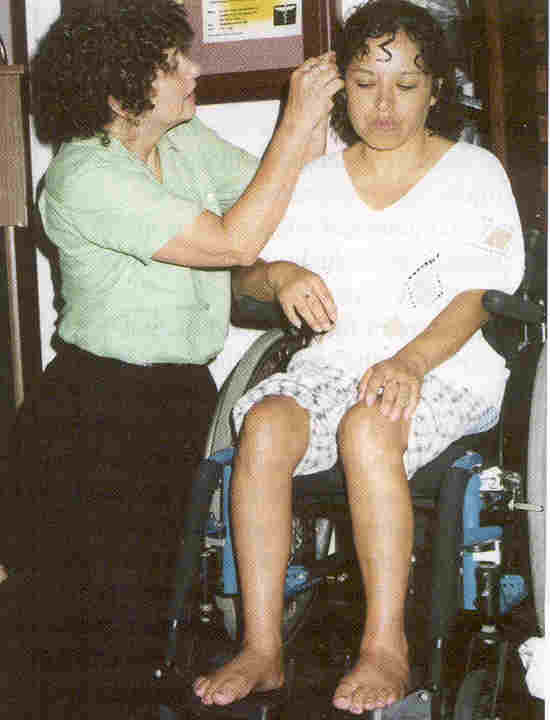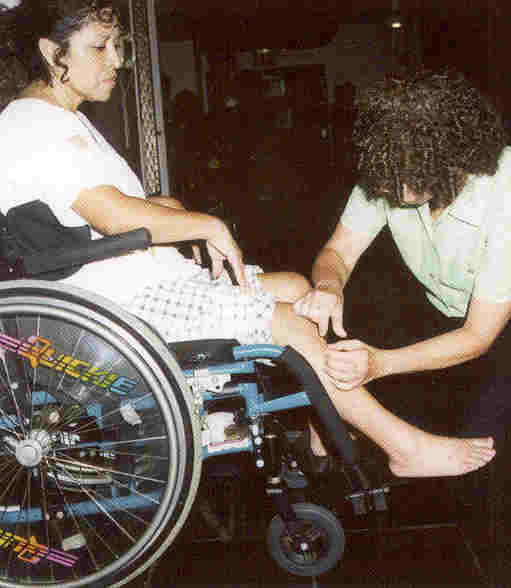
Despite the recent importance being placed on women's health issues, the
fact that many women with multiple sclerosis and other disabilities do not
know how to obtain basic medical and emotional care often goes overlooked.
Luckily, however, not by everyone.
In
an effort to provide respectful, high-quality medical services for women
with physical disabilities, the Ini tiative
for Women with Disabilities (IWD) Elly and Steve Hammerman Health and
Wellness Center is offering acupuncture and other complementary therapies
to its patients.
tiative
for Women with Disabilities (IWD) Elly and Steve Hammerman Health and
Wellness Center is offering acupuncture and other complementary therapies
to its patients.
According to IWD Director Judith Goldberg, the IWD, which is located at
New York's Hospital for Joint Diseases, was initially founded in 1997
because "there was a need for women with disabilities to get gynecological
care." Because of "lack of access, architectural and attitudinal
barriers," women with physical disabilities were not getting adequate
medical care.
In
1998, Goldberg started the Wellness Program component of IWD, which
initiated the addition of such services as yoga, nutrition counseling,
Reiki, meditation, tai chi and mind-body physical therapy. In addition to
promoting a healthy lifestyle, these programs help prevent osteoporosis,
heart disease and musculoskeletal pain.
Since its foundation, IWD has treated over 5,000 women using these complementary therapies in conjunction with Western medical care.
"The whole premise of IWD is to help women with disabilities empower
themselves," Goldberg said. "Our program is unique in the sense that we
really teach the women to be their own advocates."
 For
many years, Goldberg and Frances Goodwin (photos), a licensed
acupuncturist, had wanted to offer acupuncture to women with physical
disabilities. IWD’s Health and Wellness Program presented the opportunity
to implement this service.
For
many years, Goldberg and Frances Goodwin (photos), a licensed
acupuncturist, had wanted to offer acupuncture to women with physical
disabilities. IWD’s Health and Wellness Program presented the opportunity
to implement this service.
Acupuncture is a 3,000-year-old
practice that consists of the gentle insertion and stimulation of thin,
disposable sterile needles at strategic points near the surface of the
body. Over 2,000 acupuncture points on the human body connect with 14
major pathways, called meridians. Chinese medicine practitioners believe
that these meridians conduct qi, or energy, between the body’s surface and
internal organs. It is qi that regulates spiritual, emotional, mental and
physical balance. When the flow of qi is disrupted through poor health
habits or other circumstances, pain and/or disease can result. Acupuncture
helps to keep the normal flow of this energy unblocked.
According to a Knowledge Networks survey conducted in May 2000, women are
significantly more likely to try acupuncture, as well as other alternative
therapies, than men. The North American Menopause Society also reports
that 30 percent of women use acupuncture.
"Some of the women [at IWD] had had acupuncture before; others had heard
of it but couldn't do it because of physical, financial and emotional
barriers," Goldberg says. "Goodwin believed a clinical-style rotation
would remove these barriers and allow the opportunity to offer these
services to women with physical disabilities."
Goodwin then asked the New York branch of the Pacific College of Oriental
Medicine (PCOM) to join forces with IWD in October 2001. The first
acupuncture clinical rotation soon began, with student interns supervised
by Goodwin, a PCOM faculty member
According to Goldberg, "[The acupuncture program] got popular right away."
It was so popular, that this year the program expanded to three shifts per
week to accommodate a waiting list of approximately 80 women.
A
national survey conducted in 1997 showed that the acupuncture's popularity
at the IWD is reflective of a national trend. Total visits to
alternative-medicine practitioners have increased 47.3 % from 427 million
in 1990 to 629 million in 1997.
More hospitals – including Cedar Sinai in Los Angeles and Yonkers General
Hospital in New York - are also beginning to provide acupuncture as a
standard of care.
According to Goodwin, it's important to continue to offer acupuncture as
much as possible.
"I
believe that acupuncture should be a standard of care," she says.
"Hopefully, we'll go to an inpatient standard of care," referring to IWD's
current clinical-style outpatient program.
The
acupuncture shifts are four hours each. Over a period of 14 weeks, a
participant may receive as many as 20 acupuncture treatments. When added
together, says Goldberg, all of the PCOM interns may give as many as 500
acupuncture treatments per semester.
"The women really get a lot out of it, the interns get a lot of it, and
the supervisors really get a lot out of it," Goldberg comments. "In
general, it helps everyone. The impact on the medical community has been
invaluable. Now, there is an opening of dialogue between Eastern and
Western medicine."
Goodwin says that IWD participants have a variety of physical disabilities
that can be improved with acupuncture, including
multiple sclerosis, arthritic and spinal conditions, head trauma and
neurological disorders.
IWD
participants also feel that acupuncture has improved their conditions,
many of which are stress related.
"It
helps with stress," one woman said. "Overall, I do seem to be feeling
better."
Another participant agreed, saying, "[I liked the acupuncture treatment]
because it helped me a lot with stress and constipation."
Other participants felt more specific benefits as a result of acupuncture.
"This treatment helps me a lot with my pain," a third woman reported. "The
people are also very caring and loving. This has helped my back pain
decrease."
Shari Auth, who interned at IWD for two semesters in 2003, said it was
obvious that the participants enjoyed their acupuncture sessions.
"[The IWD participants] are so happy somebody is looking at their real
problem," Auth said. "I know their favorite part of the [IWD] program is
the acupuncture."
According to Goodwin, the acupuncture program has had visible benefits for
the IWD participants. "The women commonly report back to their neurologist
and primary care physician that the benefits of receiving acupuncture has
benefited them and improved their quality of life," she said.
The
PCOM interns, all of whom must be female because of the sensitivity of the
IWD participants, also find the externship rewarding.
"There were times when I would insert a needle in someone's leg and [that
leg] would move for the first time, and they would get really excited,"
said Margaret Greeves, a PCOM student who interned at IWD in the spring of
2003. "It made me think, 'Hey, Chinese medicine really does work.'"
Carmen Alejandro, who also interned at IWD in the spring of 2003, found
the internship rewarding as well. "The experience is a marvelous one and
one filled with much humanness and compassion, and at the same time
challenges your skills as an intern," Alejandro said.
Auth simply said, "It was the best thing I did at PCOM."
Goodwin believes that though the interns certainly
gain a valuable experience, their participation at IWD also allows women
with disabilities to improve their lives. "I think any intern with
compassion, knowledge, care and skill brings aid to IWD participants," she
said.
Perhaps it is the knowledge that they are able to
visibly improve the lives of others that makes the acupuncture externship
so popular with PCOM students.
"Even if that's not what you want to do with
acupuncture, it's such a great experience," Greeves said. "I would love to
volunteer as a licensed acupuncturist just to get the experience."
Adapted from “Paraplegia News” October 2003 (For
subscriptions, contact www.pn-magazine.com).
Contact: For more information on how women
with disabilities can benefit from acupuncture, please contact Pacific
College of Oriental Medicine at (800) 729-0941 or go to
www.PacificCollege.edu.
TOP